- Clone
- HIP1 (See other available formats)
- Regulatory Status
- RUO
- Workshop
- IV P70
- Other Names
- Glycocalicin, gpIbα
- Isotype
- Mouse IgG1, κ
- Ave. Rating
- Submit a Review
- Product Citations
- publications
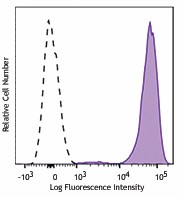
-

Human platelets were stained with CD42b (clone HIP1) Brilliant Violet 650™ (filled histogram) or mouse IgG1, κ Brilliant Violet 650™ isotype control (open histogram).
| Cat # | Size | Price | Quantity Check Availability | Save | ||
|---|---|---|---|---|---|---|
| 303925 | 25 tests | 141€ | ||||
| 303926 | 100 tests | 344€ | ||||
CD42b is a 145 kD glycoprotein known as gpIbα. It is covalently bonded to CD42c to form GPIb. CD42b is expressed on platelets and megakaryocytes. CD42b/c heterodimer forms a complex with CD42a and d and acts as the receptor for von Willibrand factor and thrombin.
Product DetailsProduct Details
- Verified Reactivity
- Human
- Reported Reactivity
- Chimpanzee
- Antibody Type
- Monoclonal
- Host Species
- Mouse
- Formulation
- Phosphate-buffered solution, pH 7.2, containing 0.09% sodium azide and BSA (origin USA).
- Preparation
- The antibody was purified by affinity chromatography and conjugated with Brilliant Violet 650™ under optimal conditions.
- Concentration
- Lot-specific (to obtain lot-specific concentration and expiration, please enter the lot number in our Certificate of Analysis online tool.)
- Storage & Handling
- The antibody solution should be stored undiluted between 2°C and 8°C, and protected from prolonged exposure to light. Do not freeze.
- Application
-
FC - Quality tested
- Recommended Usage
-
Each lot of this antibody is quality control tested by immunofluorescent staining with flow cytometric analysis. For flow cytometric staining, the suggested use of this reagent is 5 µl per million cells in 100 µl staining volume or 5 µl per 100 µl of whole blood.
Brilliant Violet 650™ excites at 405 nm and emits at 645 nm. The bandpass filter 660/20 nm is recommended for detection, although filter optimization may be required depending on other fluorophores used. Be sure to verify that your cytometer configuration and software setup are appropriate for detecting this channel. Refer to your instrument manual or manufacturer for support. Brilliant Violet 650™ is a trademark of Sirigen Group Ltd.
Learn more about Brilliant Violet™.
This product is subject to proprietary rights of Sirigen Inc. and is made and sold under license from Sirigen Inc. The purchase of this product conveys to the buyer a non-transferable right to use the purchased product for research purposes only. This product may not be resold or incorporated in any manner into another product for resale. Any use for therapeutics or diagnostics is strictly prohibited. This product is covered by U.S. Patent(s), pending patent applications and foreign equivalents. - Excitation Laser
-
Violet Laser (405 nm)
- Application Notes
-
Clone HIP1 recognizes an epitope within the N-terminal region of the GPIba chain5. Additional reported applications (for the relevant formats) include: immunohistochemical staining of acetone-fixed frozen tissue sections, Westerm blotting, and inhibition of platelet aggregation2. The Ultra LEAF™ purified antibody (Endotoxin < 0.01 EU/µg, Azide-Free, 0.2 µm filtered) is recommended for functional assays (Cat. No. 303939).
- Application References
- RRID
-
AB_2715926 (BioLegend Cat. No. 303925)
AB_2715927 (BioLegend Cat. No. 303926)
Antigen Details
- Structure
- Mucin, leucine-rich repeat family, 145 kD
- Distribution
-
Platelets, megakaryocytes
- Function
- Complex with CD42a, c and d, platelet adhesion and activation
- Ligand/Receptor
- Von Willebrand factor, thrombin
- Cell Type
- Megakaryocytes, Platelets
- Biology Area
- Cell Adhesion, Cell Biology, Immunology
- Molecular Family
- Adhesion Molecules, CD Molecules
- Antigen References
-
1. Clemetson K, et al. 1982. J. Clin. Invest. 70:304.
2. Fox J, et al. 1988. J. Biol. Chem. 263:4882.
3. Kuijpers R, et al. 1992 Blood 79:283. - Gene ID
- 2812 View all products for this Gene ID
- UniProt
- View information about CD42b on UniProt.org
Related Pages & Pathways
Pages
Other Formats
View All CD42b Reagents Request Custom Conjugation| Description | Clone | Applications |
|---|---|---|
| FITC anti-human CD42b | HIP1 | FC |
| PE anti-human CD42b | HIP1 | FC |
| Purified anti-human CD42b | HIP1 | FC,Block,IHC-F,WB |
| PerCP anti-human CD42b | HIP1 | FC |
| APC anti-human CD42b | HIP1 | FC |
| APC/Cyanine7 anti-human CD42b | HIP1 | FC |
| PerCP/Cyanine5.5 anti-human CD42b | HIP1 | FC |
| PE/Cyanine7 anti-human CD42b | HIP1 | FC |
| Alexa Fluor® 488 anti-human CD42b | HIP1 | FC |
| Brilliant Violet 650™ anti-human CD42b | HIP1 | FC |
| Alexa Fluor® 647 anti-human CD42b | HIP1 | FC |
| Alexa Fluor® 700 anti-human CD42b | HIP1 | FC |
| Brilliant Violet 510™ anti-human CD42b | HIP1 | FC |
| Brilliant Violet 421™ anti-human CD42b | HIP1 | FC |
| PE/Dazzle™ 594 anti-human CD42b | HIP1 | FC |
| TotalSeq™-A0216 anti-human CD42b | HIP1 | PG |
| Ultra-LEAF™ Purified anti-human CD42b | HIP1 | FC,Block,IHC-F,WB |
| TotalSeq™-C0216 anti-human CD42b | HIP1 | PG |
| TotalSeq™-B0216 anti-human CD42b | HIP1 | PG |
| TotalSeq™-D0216 anti-human CD42b | HIP1 | PG |
| PE anti-human CD42b | HIP1 | FC |
Customers Also Purchased
Compare Data Across All Formats
This data display is provided for general comparisons between formats.
Your actual data may vary due to variations in samples, target cells, instruments and their settings, staining conditions, and other factors.
If you need assistance with selecting the best format contact our expert technical support team.
-
FITC anti-human CD42b
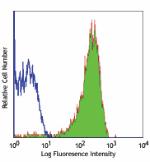
Human peripheral blood platelets stained with purified HIP1 ... -
PE anti-human CD42b
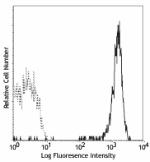
Human platelets stained with HIP1 PE -
Purified anti-human CD42b
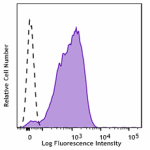
Human peripheral blood platelets stained with CD42b (clone H... -
PerCP anti-human CD42b
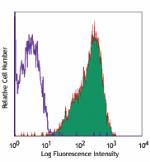
Human peripheral blood platelets stained with HIP1 PerCP -
APC anti-human CD42b
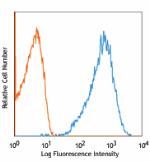
Human peripheral blood platelets stained with HIP1 APC -
APC/Cyanine7 anti-human CD42b
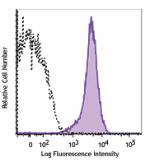
Human platelets were stained with CD42b (clone HIP1) APC/Cya... -
PerCP/Cyanine5.5 anti-human CD42b
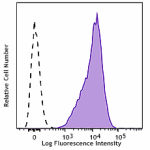
Human platelets were stained with CD42b (clone HIP1) PerCP/C... -
PE/Cyanine7 anti-human CD42b
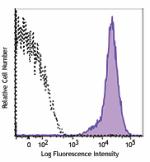
Human platelets were stained with CD42b (clone HIP1) PE/Cyan... -
Alexa Fluor® 488 anti-human CD42b
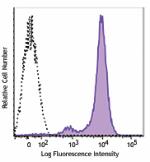
Human platelets were stained with CD42b (clone HIP1) Alexa F... -
Brilliant Violet 650™ anti-human CD42b
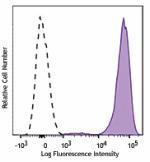
Human platelets were stained with CD42b (clone HIP1) Brillia... -
Alexa Fluor® 647 anti-human CD42b
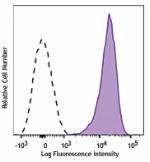
Human platelets were stained with CD42b (clone HIP1) Alexa F... -
Alexa Fluor® 700 anti-human CD42b
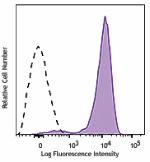
Human platelets were stained with CD42b (clone HIP1) Alexa F... -
Brilliant Violet 510™ anti-human CD42b
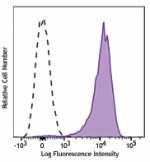
Human platelets were stained with CD42b (clone HIP1) Brillia... -
Brilliant Violet 421™ anti-human CD42b
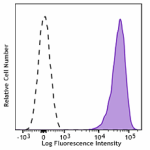
Human platelets were stained with anti-human CD42b (clone HI... -
PE/Dazzle™ 594 anti-human CD42b
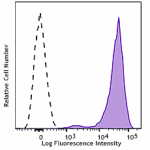
Human platelets were stained with CD42b (clone HIP1) PE/Dazz... -
TotalSeq™-A0216 anti-human CD42b
-
Ultra-LEAF™ Purified anti-human CD42b

Human peripheral blood platelets stained with CD42b (clone H... -
TotalSeq™-C0216 anti-human CD42b
-
TotalSeq™-B0216 anti-human CD42b
-
TotalSeq™-D0216 anti-human CD42b
-
PE anti-human CD42b

Typical results from human peripheral blood platelets staine...
 Login / Register
Login / Register 











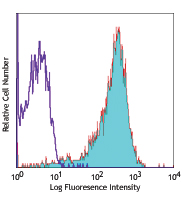
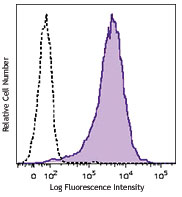

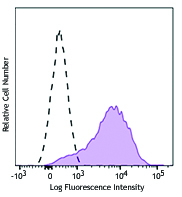



Follow Us